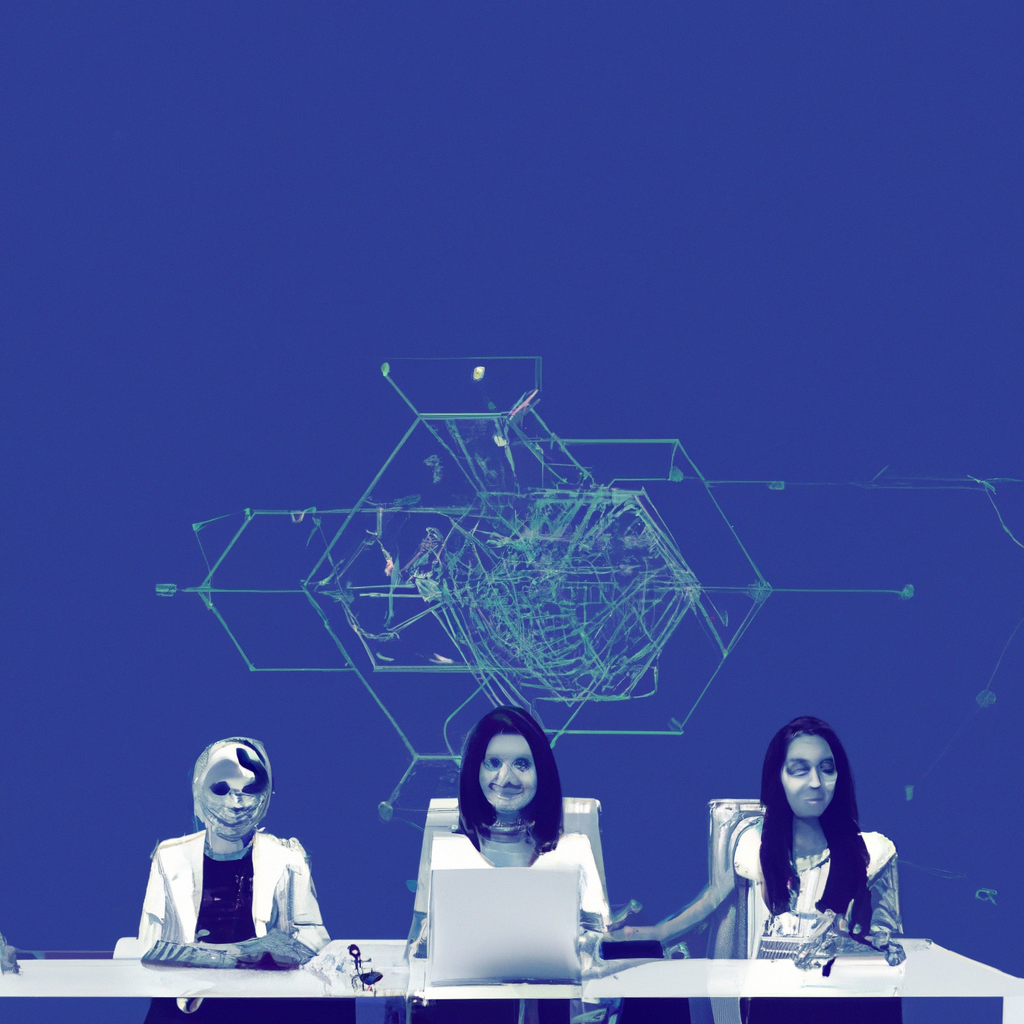Are you curious about how AI is transforming the field of human resource management? In this article, explore the evolving role of artificial intelligence in HR practices and discover how it is revolutionizing recruitment, employee engagement, and talent management. From automating mundane tasks to predicting employee performance, AI is reshaping the way organizations approach workforce management. So, let’s embark on a journey to uncover the incredible potential of AI in the realm of human resources.
Improving Recruitment Process
Identifying and attracting qualified candidates
AI plays a crucial role in streamlining the recruitment process by efficiently identifying and attracting qualified candidates. With AI-powered tools, you can leverage advanced algorithms and machine learning to analyze job descriptions and compare them with extensive databases of candidate profiles. By doing so, AI technology can quickly identify the most suitable matches based on skills, qualifications, and experience. This not only saves time and effort but also increases the chances of finding the best candidates for your organization.
Analyzing resumes and applications
AI-powered resume and application analysis tools enable HR professionals to sift through large volumes of resumes and applications more effectively. By leveraging natural language processing (NLP) and machine learning algorithms, these tools can identify key information such as qualifications, experience, and skills mentioned in resumes. Moreover, they can highlight keywords and phrases relevant to the job requirements. This automated analysis greatly speeds up the screening process, allowing HR teams to focus on the most promising candidates.
Conducting automated interviews
Another significant way AI contributes to the recruitment process is through automated interviews. AI-based chatbots and virtual assistants can conduct initial screening interviews, posing pre-determined questions to candidates and analyzing their responses. These chatbots can assess the candidate’s ability to answer questions, gauge their communication skills, and evaluate their suitability for further consideration. By automating interviews, HR teams can save valuable time and resources while ensuring a fair and consistent screening process.
Streamlining Onboarding Process
Automating paperwork and documentation
AI streamlines the onboarding process by automating paperwork and documentation. By utilizing intelligent document processing technology, HR departments can reduce the time-consuming task of manually processing paperwork. AI tools can extract relevant information from documents such as identification forms, tax documents, and contracts, and automatically input them into the appropriate systems. This automation not only speeds up the onboarding process but also minimizes the chances of human error.
Creating personalized onboarding plans
AI-driven personalization allows for the creation of tailored onboarding plans for new employees. By analyzing data about the employee’s background, skills, and preferences, AI algorithms can generate individualized onboarding plans that address specific needs and interests. These plans can include relevant training materials, introductions to key team members, and important company policies. Personalized onboarding experiences enhance employee engagement and improve the overall onboarding process.
Providing virtual onboarding assistance
Virtual onboarding assistance powered by AI offers employees a seamless onboarding experience. Chatbots and virtual assistants can provide round-the-clock support to new hires, answering frequently asked questions, guiding them through the onboarding process, and providing necessary information. These AI-powered assistants can offer a personalized touch by addressing individual concerns and ensuring that new employees feel supported and connected from day one.

This image is property of images.pexels.com.
Enhancing Employee Training and Development
Delivering personalized training content
AI technology enables the delivery of personalized training content to employees. By analyzing employee data and preferences, AI algorithms can recommend training materials and courses tailored to individual needs. This personalized approach ensures that employees receive relevant and targeted training, enhancing their skills and performance. With AI-powered learning platforms, employees can access a wide range of training resources and engage in self-paced learning, promoting continuous development within the organization.
Conducting online assessments and evaluations
AI can automate the process of conducting online assessments and evaluations, making it more efficient and accurate. By leveraging AI algorithms, HR teams can create assessments that objectively measure employee competencies, knowledge, and performance. AI-powered assessment tools can provide real-time feedback, identify areas for improvement, and generate detailed reports. These assessments enable HR to gauge the effectiveness of training programs and identify individual training needs more effectively.
Identifying skills gaps and recommending training programs
AI-driven analytics can analyze employee performance data to identify skills gaps within the organization. By comparing desired skills with the existing skill set of employees, AI algorithms can pinpoint areas where additional training is required. This data-driven approach allows HR teams to recommend specific training programs or initiatives that address the identified skills gaps. By addressing these gaps, organizations can improve overall performance and ensure that employees have the necessary skills to thrive in their roles.
Automating Routine HR Tasks
Handling employee data and records management
AI automates the handling of employee data and records management, reducing administrative tasks for HR professionals. AI-powered systems can efficiently collect, store, and analyze employee data, ensuring accuracy, accessibility, and compliance with data protection regulations. This automation minimizes the risk of errors, improves data security, and allows HR teams to focus on more strategic initiatives rather than manual data handling.
Processing payroll and benefits
AI streamlines the processing of payroll and benefits, simplifying and automating complex calculations. By integrating AI algorithms into payroll systems, organizations can automate the calculation of salaries, deductions, taxes, and benefits. This automation ensures accuracy, reduces the chances of human error, and saves time for HR teams. Moreover, AI-powered payroll systems can adapt to changes in regulations or policies, ensuring compliance and avoiding potential compliance issues.
Managing time-off requests and scheduling
AI tools can automate the management of time-off requests and scheduling, making the process quicker and more efficient. By leveraging AI algorithms, organizations can easily handle employee requests for vacations, leaves, or time off. AI-powered systems can analyze employee availability, team schedules, and workload to optimize scheduling and minimize conflicts. This automation reduces the administrative burden on HR teams and ensures fair and efficient scheduling for employees.

This image is property of images.pexels.com.
Promoting Employee Engagement and Retention
Conducting sentiment analysis and employee surveys
AI allows organizations to conduct sentiment analysis and employee surveys to gauge employee satisfaction and engagement. With AI-powered algorithms, organizations can analyze employee feedback and sentiment expressed in surveys, emails, chat logs, and other sources. This analysis helps HR teams identify patterns, trends, and areas of concern. By addressing these concerns proactively, organizations can improve employee engagement and overall satisfaction, leading to increased retention rates.
Offering personalized career development plans
AI enables the creation of personalized career development plans for employees. By analyzing employee performance data, skills, aspirations, and interests, AI algorithms can generate tailored career development recommendations. These recommendations can include targeted training opportunities, mentorship programs, or projects that align with individual goals. Personalized career development plans show employees that their professional growth is valued, increasing job satisfaction and loyalty to the organization.
Identifying flight risk employees
AI can help organizations identify flight risk employees, those who are at a higher risk of leaving the company. By analyzing various data points such as employee engagement, performance, career progression, and external factors, AI algorithms can assess the likelihood of an employee looking for other opportunities. Identifying flight risk employees allows HR teams to take proactive measures such as offering career advancement opportunities, addressing concerns, or providing additional support to retain valuable talent.
Assisting in Performance Management
Monitoring employee performance in real-time
AI enables real-time monitoring of employee performance, providing valuable insights for performance management. By utilizing AI-powered performance management tools, organizations can track employee progress, project outcomes, and performance metrics. Real-time monitoring allows HR teams to identify areas where employees excel or struggle promptly. This information facilitates effective feedback and coaching, ultimately improving employee performance and productivity.
Providing objective performance evaluations
AI-based performance evaluation tools can provide objective and unbiased assessments of employee performance. By removing human bias and subjectivity from the evaluation process, AI algorithms ensure fairness and accuracy in performance assessments. These tools can analyze multiple data points, such as productivity, quality of work, and adherence to deadlines, to generate comprehensive performance evaluations. Objective evaluations provide employees with valuable feedback, enabling them to make improvements and grow professionally.
Offering feedback and coaching recommendations
AI can offer feedback and coaching recommendations to employees based on their performance data. By analyzing employee performance metrics, AI algorithms can provide personalized feedback, identifying areas for improvement and suggesting specific actions to enhance performance. AI-powered coaching tools can simulate coaching scenarios, offer guidance, and recommend strategies for professional growth. These AI-driven coaching recommendations empower employees to take control of their development and enhance their skills.

This image is property of images.pexels.com.
Ensuring Fairness and Reducing Bias
Eliminating human bias in candidate selection processes
AI helps eliminate human bias in candidate selection processes by utilizing objective algorithms and criteria. By removing personal characteristics such as gender, age, or ethnicity from applications, AI algorithms focus solely on skills, qualifications, and experience. This promotes fairness, diversity, and equal opportunities for all candidates. Implementing AI in candidate selection processes ensures that decisions are based on merit, reducing the potential for biased judgments.
Identifying wage gaps and pay disparities
AI can analyze salary data and employee profiles to identify wage gaps or pay disparities within an organization. By evaluating factors such as job roles, experience, qualifications, and performance, AI algorithms can highlight any discrepancies or inequalities. Identifying wage gaps allows HR teams to address disparities and ensure fair compensation practices. AI-driven analysis promotes transparency and equality in the workplace, contributing to a more inclusive and diverse organization.
Ensuring compliance with diversity and inclusion initiatives
AI assists organizations in ensuring compliance with diversity and inclusion initiatives. By analyzing employee data and demographics, AI algorithms can help HR teams track diversity metrics and identify areas that need improvement. AI-powered systems can also provide recommendations on diversity initiatives, such as targeted recruitment strategies, diversity training programs, or diversity-focused employee resource groups. By leveraging AI, organizations can foster a more inclusive and diverse workforce.
Predictive Analytics for HR Decision-making
Forecasting talent needs and workforce planning
AI-driven predictive analytics enables organizations to forecast future talent needs and plan their workforce effectively. By analyzing historical data, market trends, and employee turnover rates, AI algorithms can predict future talent gaps or surpluses. This allows HR teams to proactively hire, develop, or retain talent to align with the organization’s strategic goals. Leveraging predictive analytics facilitates more informed decision-making and ensures that the right talent is available at the right time.
Predicting turnover rates and attrition
AI technologies can predict turnover rates and attrition within an organization. By analyzing various data points such as employee satisfaction, engagement, performance, and external factors, AI algorithms can identify patterns and indicators of potential turnover. Predicting turnover allows HR teams to take preventive measures such as improving employee engagement, addressing workplace issues, or offering career development opportunities to reduce attrition rates. Accurate turnover predictions enable organizations to develop effective retention strategies and maintain a stable workforce.
Analyzing data to optimize HR strategies
AI-powered data analytics plays a vital role in optimizing HR strategies. By analyzing large volumes of data, AI algorithms can identify trends, patterns, and correlations that may not be apparent to human analysts. AI-driven analytics can provide valuable insights into employee performance, engagement levels, and HR processes. These insights help HR teams make data-driven decisions, improve operational efficiency, and develop strategies that align with organizational goals. Leveraging AI for analytics empowers HR professionals to optimize their decision-making process and drive positive change within their organizations.

Maintaining Data Security and Privacy
Implementing robust cybersecurity measures
AI supports the implementation of robust cybersecurity measures to ensure data security and privacy. By utilizing AI algorithms, organizations can identify and respond to potential security threats, detect anomalies, and protect sensitive employee data. AI-powered cybersecurity systems can continuously monitor network traffic, identify potential vulnerabilities, and respond to security incidents in real-time. Implementing AI-driven cybersecurity measures safeguards employee data and ensures compliance with privacy regulations.
Ensuring compliance with data protection regulations
AI assists HR teams in ensuring compliance with data protection regulations. AI algorithms can automatically scan and analyze employee data, identifying any potential privacy violations or non-compliance. These algorithms can detect sensitive information, monitor data access and usage, and provide insights into data protection practices. By leveraging AI, organizations can proactively ensure compliance with data protection regulations, avoiding potential penalties and reputational damage.
Maintaining confidentiality in employee data handling
AI technology helps maintain confidentiality in employee data handling. AI-driven systems can automatically monitor data access, restrict unauthorized access, and encrypt sensitive employee data. This ensures that only authorized personnel can access confidential information and reduces the risk of data breaches. By maintaining confidentiality in employee data handling, organizations establish trust with their employees and demonstrate their commitment to protecting their privacy.
Addressing Ethical Concerns in AI Adoption
Preventing algorithmic bias and discrimination
Addressing algorithmic bias is a critical ethical concern in AI adoption. HR departments must ensure that AI algorithms are trained on unbiased and diverse datasets to avoid perpetuating discriminatory practices. Regular algorithm monitoring, evaluation, and continuous improvement are necessary to minimize bias and discrimination in AI-driven HR processes. Transparency in the selection criteria and regular audits of the AI systems can help identify and rectify any potential biases.
Promoting transparency and explainability
To address ethical concerns, AI systems used in HR must be transparent and explainable. Organizations should strive to ensure that the decision-making process employed by AI algorithms is understandable to humans. This transparency enables HR professionals and employees to comprehend the factors considered by AI systems when making decisions. By promoting transparency and explainability, organizations foster trust and mitigate concerns associated with AI adoption in HR.
Ensuring AI is used in an ethical and responsible manner
Ethical and responsible use of AI in HR is paramount. Organizations should establish clear ethical guidelines and policies governing the usage of AI systems. Regular monitoring and audits of AI algorithms are necessary to ensure adherence to these guidelines. HR departments must continuously evaluate the impact of AI on employees, consider ethical implications, and adapt their practices accordingly. By prioritizing ethical and responsible AI adoption, organizations can build a culture of trust and fairness in their HR processes.
In conclusion, AI plays a transformative role in human resource management, revolutionizing various aspects of the HR function. From recruitment to performance management, AI-powered technology enables organizations to streamline processes, enhance employee development, ensure fairness, and make data-driven decisions. However, it is crucial to address ethical concerns, transparency, and biases associated with AI adoption to ensure that the use of AI in HR is responsible, fair, and beneficial for all stakeholders involved. Through careful implementation and continuous evaluation, AI can empower HR professionals to enhance their effectiveness and contribute to the success of their organizations.
